BC Ferries
British Columbia Ferry Services Inc., operating as BC Ferries (BCF), is a former provincial Crown corporation, now operating as an independently managed, publicly owned Canadian company. BC Ferries provides all major passenger and vehicle ferry services for coastal and island communities in the Canadian province of British Columbia. Set up in 1960 to provide a similar service to that provided by the Black Ball Line and the Canadian Pacific Railway, which were affected by job action at the time, BC Ferries has become the largest passenger ferry line in North America,[2] operating a fleet of 41 vessels with a total passenger and crew capacity of over 27,000, serving 47 locations on the B.C. coast.
| BC Ferries | |
| Type | Organized as a privately held company, with the provincial Crown as sole shareholder |
| Industry | Transportation |
| Founded | Victoria, British Columbia (June 15, 1960) |
| Headquarters | Victoria, British Columbia, Canada |
Key people | Joy MacPhail, Chair Nicolas Jimenez, President & CEO |
| Products | Ferry service |
| Revenue | |
| Owner | BC Ferry Authority (Government of British Columbia) |
Number of employees | 4,500 (2017) |
| Website | www |
The federal and provincial governments subsidize BC Ferries to provide agreed service levels on essential links between the BC mainland, coastal islands, and parts of the mainland without road access. The inland ferries operating on British Columbia's rivers and lakes are not run by BC Ferries. The responsibility for their provision rests with the British Columbia Ministry of Transportation and Infrastructure, which contracts operation to various private sector companies.
Structure
At its inception, BC Ferries was a division of the British Columbia Toll Highways and Bridges Authority, a provincial Crown corporation. Through successive reorganizations, it evolved into the British Columbia Ferry Authority and then the British Columbia Ferry Corporation, both of which were also provincial Crown corporations. In 2003, the Government of British Columbia announced that BC Ferries, which had been in debt, would be reorganized into a private corporation, implemented through the passage of the Coastal Ferry Act[3] (Bill 18–2003). The single voting share of BC Ferries Corporation is held by the provincial government's BC Ferry Authority, which operates under the rules of the Act.
History
In the summer of 1958, a strike by employees of CP Steamships and the Black Ball Line caused the Social Credit government of W. A. C. Bennett to decide that the coastal ferry service in British Columbia needed to be government-owned, and so it set about creating BC Ferries. Minister of Highways Phil Gaglardi was tasked with overseeing the new Crown corporation and its rapid expansion.
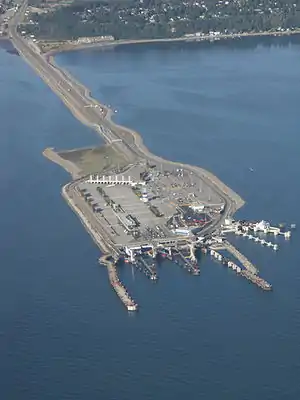
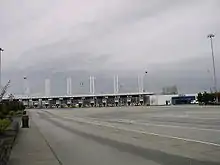
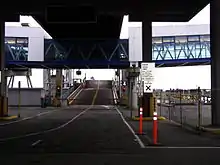
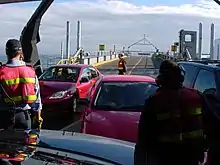
BC Ferries' first route, commissioned in 1960, was between Swartz Bay, north of Sidney on Vancouver Island, and Tsawwassen, an area in Delta, using just two vessels. These ships were the now-retired MV Tsawwassen and the MV Sidney. The next few years saw a dramatic growth of the B.C. ferry system as it took over operations of the Black Ball Line and other major private companies providing vehicle ferry service between Vancouver Island and the Lower Mainland. As the ferry system expanded and started to service other small coastal communities, BC Ferries had to build more vessels, many of them in the first five years of its operations, to keep up with the demand. Another method of satisfying increasing demand for service was BC Ferries' unique "stretch and lift" program, involving seven vessels being cut in half and extended, and five of those vessels later cut in half again and elevated, to increase their passenger and vehicle-carrying capacities. The vast majority of the vessels in the fleet were built in B.C. waters, with only two foreign purchases and one domestic purchase. In the mid-1980s, BC Ferries took over the operations of the saltwater branch of the B.C. Ministry of Transportation and Highways, which ran ferry services to very small coastal communities. This action dramatically increased the size of BC Ferries' fleet and its geographical service area. The distinctive "dogwood on green" flag that BC Ferries used between 1960 and 2003 gave the service its popular nickname "the Dogwood Fleet".
During the 1990s, the NDP government commissioned a series of three fast ferries to improve ferry service between the Mainland and Vancouver Island. The ships proved problematic when they suffered many technical issues and cost double what was expected. The fast ferries were eventually sold off for $19.4 million in 2003.
A controversy began in July 2004 when BC Ferries, under a new American CEO, announced that the company had disqualified all Canadian bids to build three new Coastal-class ships, and only the proposals from European shipyards were being considered. The contract was estimated at $542 million for the three ships, each designed to carry 370 vehicles and 1600 passengers.
The argument for domestic construction of the ferries was that it would employ numerous British Columbia workers, revitalize the sagging B.C. shipbuilding industry, and entitle the provincial government to a large portion of the cost in the form of taxes. BC Ferries CEO David Hahn claimed that building the ferries in Germany would "save almost $80 million and could lead to lower fares."[4]
On September 17, 2004, BC Ferries awarded[5] the vessel construction contract to Germany's Flensburger shipyard. The contract protected BC Ferries from any delays through a fixed price and fixed schedule contract. Coastal Renaissance entered service in March 2008, while Coastal Inspiration was delivered the same month and entered service in June that year. The third ship, Coastal Celebration, was delivered and is in service as well.
On August 18, 2006, BC Ferries commissioned[6] Flensburger to build a new vessel for its Inside Passage route, with the contract having many of the same types of terms as that for the Coastal-class vessels. The new northern service vessel, Northern Expedition, has been delivered.
On August 26, 2012, BC Ferries announced that it would be cutting 98 round trips on its major routes starting in the fall and winter of 2012 as part of a four-year plan to save $1 million on these routes. Service cuts have included the elimination of supplementary sailings on the Swartz Bay–Tsawwassen route, 18 round trips on the Horseshoe Bay–Departure Bay route, and 48 round trips, the largest number of cuts, on the Duke Point–Tsawwassen route, with plans to look for savings on the smaller unprofitable routes in the future.[7]
Free ferry trips for seniors were suspended from April 2014[8] to April 2018.[9]
In the fall of 2014, BC Ferries announced the addition of three new Intermediate-class ferries to phase out Queen of Burnaby and Queen of Nanaimo.[10][11] These three vessels were to be named the Salish class; Salish Orca, Salish Eagle and Salish Raven. In 2022, Salish Heron, the fourth Salish-class vessel, entered service. All four ferries were designed and built by Remontowa Shipbuilding S.A. in Gdansk, Poland, and are dual-fuel, capable of operating on liquefied natural gas and marine diesel. These vessels are a part of BC Ferries standardized fleet plan, which will take the number of ship classes in the BC Ferries fleet from 17 to 5.[12] The proposed replacement classes are Northern, Major, Salish, Shuttle and Island. Additionally, there are three unique vessels. BC Ferries has stated that total standardization of the BC Ferries fleet will not be complete for another 40 years.
Financial results
|
Year End [13] | Operating Revenue ($M) | Operating Earnings ($M) | Service Fees (Ferry Tspt.) ($M) | Other Govt. Subsidies ($M) | Net Regulatory Earnings ($M) |
|---|---|---|---|---|---|
| 2005 | 422 | (4) | 92 | 24 | 40 |
| 2006 | 436 | 11 | 92 | 25 | 50 |
| 2007 | 452 | 7 | 91 | 25 | 49 |
| 2008 | 481 | 8 | 104 | 26 | 37 |
| 2009 | 523 | 21 | 103 | 26 | 9 |
| 2010 | 549 | 35 | 126 | 27 | 3 |
| 2011 | 557 | 30 | 125 | 27 | 4 |
| 2012 | 555 | 25 | 127 | 27 | (16) |
| 2013 | 571 | 47 | 149 | 28 | 15 |
| 2014 | 594 | 62 | 144 | 28 | 25 |
| 2015 | 620 | 82 | 148 | 28 | 41 |
| 2016 | 673 | 99 | 144 | 29 | 65 |
| 2017 | 697 | 113 | 155 | 29 | 88 |
| 2018 | 735 | 104 | 159 | 30 | 71 |
| 2019 | 712 | 65 | 188 | 31 | 57 |
| 2020 | 707 | 33 | 198 | 31 | 22 |
| 2021 | 460 | (146) | 194 | 218 | 22 |
Current routes
Patronage
Route numbers are used internally by BC Ferries. All routes except 13 and 55 allow vehicles.[13]
Figures displayed are annual vehicle equivalent and annual passengers.
Route 1 – Georgia Strait South (Highway 17): Swartz Bay to Tsawwassen
Route 2 – Georgia Strait Central (Highway 1): Nanaimo (via Departure Bay) to Horseshoe Bay
Route 3 – Howe Sound: Langdale to Horseshoe Bay
Route 4 – Satellite Channel: Swartz Bay to Saltspring Island (at Fulford Harbour)
Route 5 – Swanson Channel: Swartz Bay to the Southern Gulf Islands (Galiano, Mayne, Pender, and Saturna Islands)
Route 6 – South Stuart Channel: Crofton to Saltspring Island (at Vesuvius)
Route 7 – Jervis Inlet (Highway 101): Earls Cove to Saltery Bay
Route 8 – Queen Charlotte Channel: Horseshoe Bay to Bowen Island (at Snug Cove)
Route 9 – Active Pass Shuttle: Tsawwassen to the Southern Gulf Islands (Galiano, Mayne, Pender and Saltspring Islands)
Route 10 – Inside Passage: Port Hardy to Prince Rupert (with stops at Bella Bella and Klemtu) Route 10 Supplemental: servicing Bella Bella, Shearwater, Ocean Falls and Bella Coola (as of mid-2014)
Route 11 – Hecate Strait (Highway 16): Prince Rupert to Haida Gwaii (via Skidegate)
Route 12 – Saanich Inlet: Brentwood Bay to Mill Bay
Route 13 – Thornbrough Channel: Langdale to Gambier Island (via New Brighton) and Keats Island (via Keats Landing and Eastbourne). (Foot passengers only, no vehicles). (Operated by Kona Winds Yacht Charters Ltd.)
Route 17 – Georgia Strait North: Powell River (via Westview) to Comox (via Little River)
Route 18 – Malaspina Strait: Powell River to Texada Island (via Blubber Bay)
Route 19 – Northumberland Channel: Nanaimo Harbour to Gabriola Island (via Descanso Bay)
Route 20 – North Stuart Channel: Chemainus to Thetis and Penelakut Islands
Route 21 – Baynes Sound: Buckley Bay to Denman Island (via Denman West)
Route 22 – Lambert Channel: Denman Island (via Gravelly Bay) to Hornby Island (via Shingle Spit)
Route 23 – Discovery Passage: Campbell River to Quadra Island (via Quathiaski Cove)
Route 24 – Sutil Channel: Quadra Island (via Heriot Bay) to Cortes Island (via Whaletown)
Route 25 – Broughton Strait: Port McNeill to Alert Bay (on Cormorant Island) and Sointula (on Malcolm Island)
Route 26 – Skidegate Inlet: Skidegate (on Graham Island) to Alliford Bay (on Moresby Island)
Route 28 – Discovery Coast: Port Hardy to Bella Coola (Commenced summer 2018) [14]
Route 30 – Mid-Island Express (Highway 19): Nanaimo (via Duke Point to Tsawwassen)
- Route 55 – Georgia Strait North-Central: French Creek to Lasqueti Island (via False Bay). (Foot passengers only, no vehicles) (Operated by Western Pacific Marine).[15]
- Unnumbered Route – Inside Passage: Prince Rupert to Port Simpson (also known as Lax Kw'alaams). (Operated by the Lax Kw'alaams First Nation community).
Maps
Numbers in blue circles are ferry route numbers. Provincial highway trailblazers are added where appropriate.
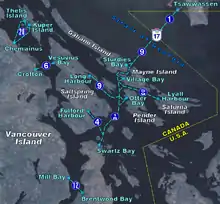 Zone 1 – Southern Gulf Islands
Zone 1 – Southern Gulf Islands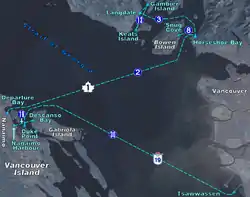 Zone 2 – Central Georgia Strait
Zone 2 – Central Georgia Strait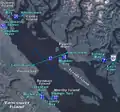 Zone 3 – Northern Georgia Strait
Zone 3 – Northern Georgia Strait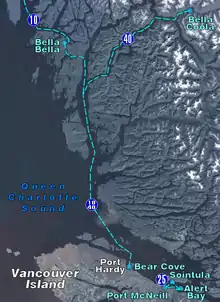 Zone 4 – Queen Charlotte Sound
Zone 4 – Queen Charlotte Sound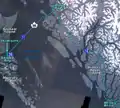 Zone 5 – North Coast
Zone 5 – North Coast
Fleet
BC Ferries has the largest fleet of vehicle ferry vessels in the world. There are 36 vessels, ranging from small 16-car ferries up to 470-car superferries. All of the vessels in use by BC Ferries are roll-on/roll-off car ferries. Most of the major vessels are based on similar designs, which are aggregated into classes of ferries:
Current vessels
| Name | Class | Year built (Rebuilt) | Auto capacity | Passenger capacity | Notes | Route(s) | Photo |
|---|---|---|---|---|---|---|---|
| MV Island Gwawis | Island | 2021 | 47 | 300 | Hybrid diesel-electric; Entered service on April 12, 2022 | 19 | 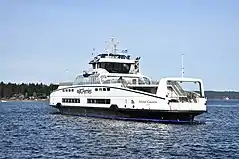 |
| MV Island Kwigwis | Island | 2021 | 47 | 300 | Hybrid diesel-electric; Entered service on April 12, 2022 | 19 | 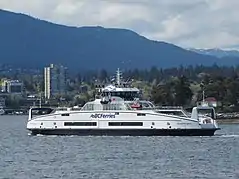 |
| MV Island K'ulut'a | Island | 2020 | 47 | 300 | Hybrid diesel-electric; Entered service on January 17, 2023 | 23 | 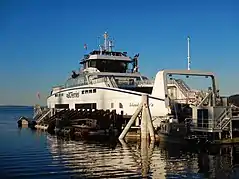 |
| MV Island Nagalis | Island | 2020 | 47 | 300 | Hybrid diesel-electric; Entered service on January 18, 2023 | 23 | 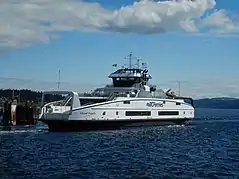 |
| MV Island Aurora | Island | 2017-2019 | 47 | 300 | Hybrid diesel-electric; Entered service on June 18, 2020 [16] | 25 | 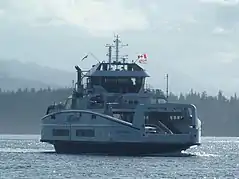 |
| MV Island Discovery | Island | 2017-2019 | 47 | 300 | Hybrid diesel-electric; Entered service on June 10, 2020 | 18 | 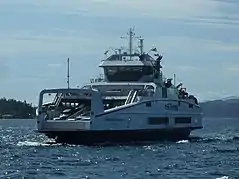 |
| MV Spirit of British Columbia | Spirit | 1993 (2017 - 2018) | 358 | 2100 | Converted to marine diesel and LNG between 2017 and 2018. Entered service in 1992.[17] | 1 | 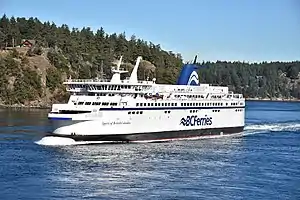 |
| MV Spirit of Vancouver Island | Spirit | 1994 (2018 - 2019) | 358 | 2100 | Converted to marine diesel and LNG in 2018. Entered service in 1994.[18] | 1 | 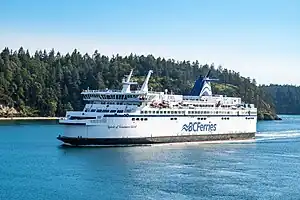 |
| MV Coastal Renaissance | Coastal | 2007 | 310 | 1604 | Formerly the world's largest double-ended ferries. Built in Germany. Entered Service on March 8, 2008. | 1, 30 (Currently out of service for repairs) | 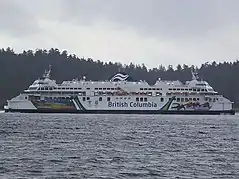 |
| MV Coastal Inspiration | Coastal | 2007 | 310 | 1604 | Formerly the world's largest double-ended ferries. Built in Germany. Entered Service on June 16, 2008. | 30 | 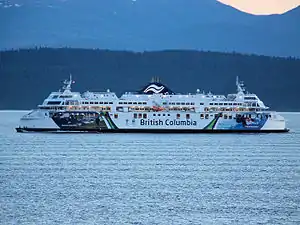 |
| MV Coastal Celebration | Coastal | 2007 | 310 | 1604 | Formerly the world's largest double-ended ferries. Built in Germany. Entered service on November 21, 2008. | 1 | 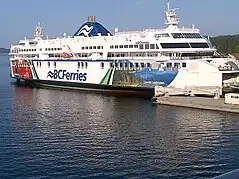 |
| MV Queen of Coquitlam | C | 1976 (2003) | 316 | 1494 | Entered service in 1976. | 2 & 3 |  |
| MV Queen of Cowichan | C | 1976 (2004) | 312 | 1494 | Entered service in 1976. | 2 | 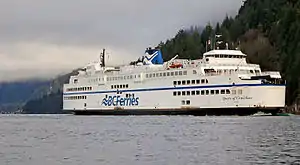 |
| MV Queen of Alberni | C | 1976 (1984/ 2007) | 280 | 1200 | Upper car deck added in 1984. Entered service in 1976. | 30 (all other times based out of Tsawwassen as main vessel),(secondary out of Nanaimo in summer, based out of Departure Bay) | 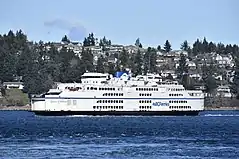 |
| MV Queen of Oak Bay | C | 1981 (2005) | 308 | 1494 | Entered service in 1981. | 2 | 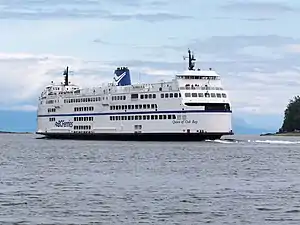 |
| MV Queen of Surrey | C | 1981 (2006) | 308 | 1494 | Entered service in 1981. | 3 | 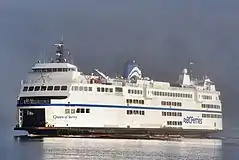 |
| MV Queen of New Westminster | None | 1964 (1973/ 1991/ 2009) | 254 | 1332 | Originally a V-class ferry when built. Entered service on August 4, 1964. | 1 | 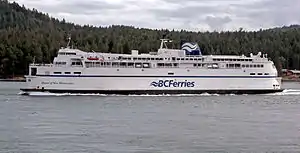 |
| MV Salish Orca | Salish | 2016 | 138 | 600 | Entered service on May 16, 2017. | 9, 17 | 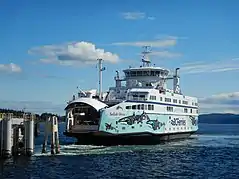 |
| MV Salish Eagle | Salish | 2016 | 138 | 600 | Entered service in the Summer of 2017. | 5, 9, 17 | 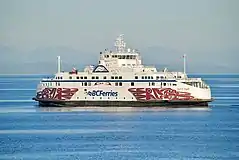 |
| MV Salish Raven | Salish | 2016 | 138 | 600 | Entered service on July 27, 2017. | 5, 9, 17 | 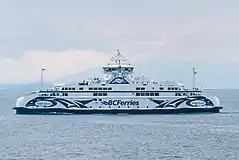 |
| MV Salish Heron | Salish | 2020 | 138 | 600 | Entered service on May 6, 2022. | 5, 9 | 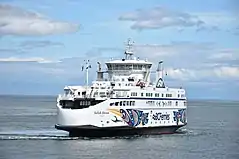 |
| MV Northern Expedition | None | 2009 | 115 | 600 | Entered service on May 18, 2009. | 10, 11 | .jpg.webp) |
| MV Northern Adventure | None | 2004 | 87 | 600 | Purchased in late-2006 to replace the sunken Queen of the North. | 10, 11 | 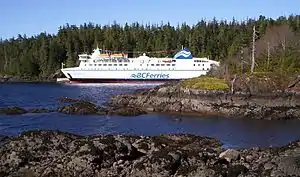 |
| MV Queen of Capilano | I | 1991 (2015) | 100 | 462 | Auto Capacity increased from 85 in 2015. Entered service in June 1991. | 8 | 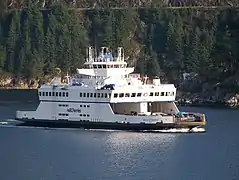 |
| MV Queen of Cumberland | I | 1992 (2016) | 112 | 462 | Entered service in late 1992. | 5 4, 7, 8 (Relief) |
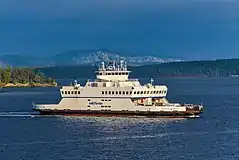 |
| MV Malaspina Sky | I | 2008 | 112 | 450 | Entered service in February 2009. | 7 | 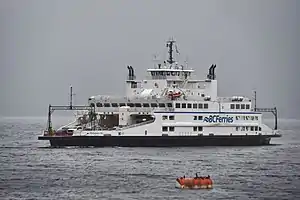 |
| MV Skeena Queen | Century | 1997 | 92 | 600 | Entered service in 1997. | 4 | 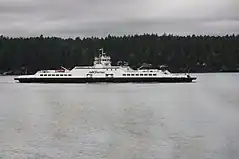 |
| MV Quinitsa | Q | 1977 (2008) | 44 | 394 | Transferred to BC Ferries in 1985. | 22 (summer, relief other times) 6, 19, 21 (relief) |
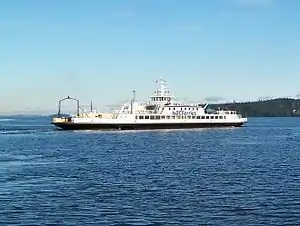 |
| MV Baynes Sound Connector | None | 2015 | 45 | 150 | First and only cable ferry owned by BC Ferries & world's longest cable ferry. Entered service in February 2016. | 21 | 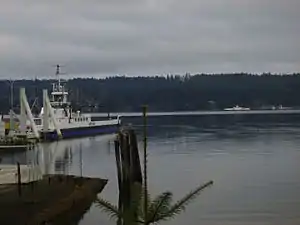 |
| MV Quinsam | Q | 1982 (2010) | 63 | 400 | Transferred to BC Ferries in 1985. | 6 |  |
| MV Quadra Queen II | T | 1969 (2010) | 26 | 293 | Transferred to BC Ferries in 1985. | 24, 25 (relief) | 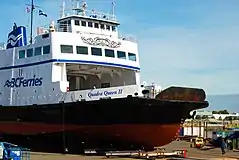 |
| MV Tachek | T | 1969 (2011) | 26 | 243 | Transferred to BC Ferries in 1985. | 24 | 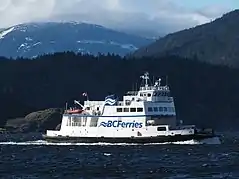 |
| MV Klitsa | K | 1972 | 19 | 195 | Transferred to BC Ferries in 1985. | 12 | _-_panoramio.jpg.webp) |
| MV Kahloke | K | 1973 | 21 | 200 | Transferred to BC Ferries in 1985. | 21 (summer), 22 (excluding summer) 12, 20 (relief) |
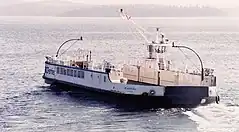 |
| MV Kwuna | K | 1975 | 16 | 154 | Transferred to BC Ferries in 1985. | 26 | 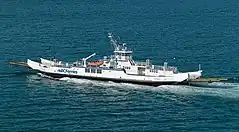 |
| MV Kuper | K | 1985 (2006) | 26 | 269 | Purchased in 2006. | 20 | 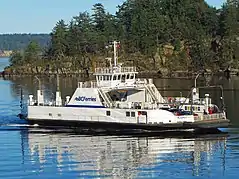 |
| MV Nicola (also known as Spirit of Lax Kw' alaams) | N | 1960 | 16 | 133 | Transferred to BC Ferries in 1985 Owned by but not operated by BC Ferries. |
Unnumbered Route (Operated by the Lax Kw'alaams First Nation community). | 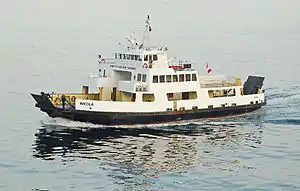 |
| MV Northern Sea Wolf | None | 2000 | 35 | 150 | Purchased in 2017.[19] | 28 |  |
| MV Stormaway III | None | n/k | 0 | 40 | Owned and operated by Kona Winds Yacht Charters Limited, under the sponsorship of and out of the Langdale terminal of BC Ferries, since 2003. | 13 (Operated by Kona Winds Yacht Charters Ltd). |
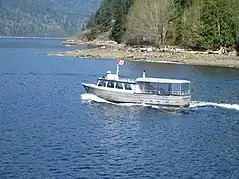 |
| MV Stormaway IV | None | n/k | 0 | 40 | Owned and operated by Kona Winds Yacht Charters Limited, under the sponsorship of and out of the Langdale terminal of BC Ferries, since 2010. | 13 (Operated by Kona Winds Yacht Charters Ltd). | .jpg.webp) |
| MV Centurion VII | None | n/k | 0 | 60 | Owned and operated by Western Pacific Marine, under the sponsorship of BC Ferries, and out of Western Pacific Marine's French Creek Terminal, since 2011. | 55 (Operated by Pacific Western Marine). | 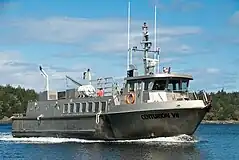 |
Former vessels
Future vessels
In 2019, BC started a $200 million program to acquire four hybrid/electric ferries (800 kWh each) to service three routes.[20] As for the remaining seven vessels within the 12-year capital plan, they will all be large ships, which will replace six aging ships and provide one additional vessel to support growth and improve resiliency. Marshall says the first of these new large ships will enter service in 2029.[21]
| Name | Class | Year built (Rebuilt) | Auto capacity | Passenger capacity | Notes | Route(s) |
|---|---|---|---|---|---|---|
| Island Class 2nd Batch | Island | TBA | 47 | 400 | 4 BC built ships are full electric and retire T Class | 24,22,6 and Relief Vessel |
| Major Vessel | TBA | Start 2028-2035 | 360 ish | 1200 ish | 7 Ships electric double ended and retire MV Queen of New Westminster also C Class | 1,2,3,30 and Relief Vessel |
Accidents and incidents
The following is a summary of some of the incidents that have occurred involving BC Ferries vessels.
Queen of Alberni
On August 9, 1979, Queen of Alberni was transiting through Active Pass when it ran aground on Galiano Island, tipping fifteen degrees to starboard. Several large commercial vehicles on board the vessel at the time were damaged.[22] No persons were injured, but a racehorse on board died.[23] This accident suspended all C-class vessels from travelling on Route 1 or any of the Southern Gulf Islands routes.
In June 1989, the vessel slammed into the loading dock at Departure Bay at about eight knots. Six people sustained slight injuries, including one who fell down a stairway.[24] The ship received a scrape and some onboard vehicles were damaged.[25]
On March 12, 1992, at 8:08am (16:08 UTC), Queen of Alberni collided with the Japanese freighter Shinwa Maru southwest of Tsawwassen. The collision occurred in heavy fog, with both vessels suffering minor damage. Injuries included 2 serious and 25 minor injuries for the 260 people on the ferry, while none of the 11 people aboard the freighter received injuries.[26]
Queen of Burnaby
On August 25, 1966, the Queen of Burnaby broke her mooring at Departure Bay terminal while engines were being run in the early morning. The variable-pitch propellers were not left in the neutral position as was standard, and no crew was present on the bridge. The ferry was recovered after the anchor was dropped and the captain was shuttled to the vessel, and all sailing continued with no change of scheduling.[27]
Queen of Coquitlam
On October 19, 1980, Queen of Coquitlam sustained $3 million of damage on tipping in the Burrard Shipyard floating drydock.[28]
In October, 1995, the vessel lost power and slammed into pilings at Horseshoe Bay, damaging its bow.[29]
Queen of Cowichan
On August 12, 1985, three occupants were killed when Queen of Cowichan ran over a pleasure boat near the Horseshoe Bay terminal.[30] The BC Court of Appeal found the Cowichan two thirds at fault and ordered that $500,000 in damages be paid.[31]
On October 19, 2019, a crew member was significantly injured after being hit by the vessel's bow door which was having trouble opening at Horseshoe Bay terminal. The next round trip to Departure Bay and back was subsequently cancelled.[32]
Queen of Cumberland
On April 18, 2018, Queen of Cumberland crew members were injured during a safety drill at Swartz Bay ferry terminal. When a hoist cable parted on the ship's davit, a rescue boat holding two occupants fell about 11 metres (36 ft) into the water. The boat was damaged and the individuals injured, one seriously.[33]
Queen of the Islands
On September 20, 1978, Queen of the Islands rammed the Saltery Bay dock causing $495,000 worth of damage.[34]
Queen of Nanaimo
On November 2, 2013, Queen of Nanaimo was pushed off course by severe weather as it was leaving the berth at Village Bay, Mayne Island. It damaged a private dock, and no one was injured. There was damage to the ship and all Tsawwassen–Gulf Islands sailings had to be cancelled while it was repaired.[35]
Queen of New Westminster
On October 20, 1971, Queen of New Westminster pulled out of its berth at the Departure Bay terminal while vehicle loading was in progress. A car and its two occupants fell into the water. Both of the vehicle's occupants were rescued.[36]
In a similar incident, on August 13, 1992, the Queen of New Westminster pulled out of its berth at the Departure Bay terminal while vehicle loading ramps were still lowered and resting on the ship. Three people were killed, including two children, one was seriously injured, and two others received minor injuries when a van containing 6 people fell 15 m (49 ft) from the upper deck onto the lower car deck and finally into the sea below. The van had been stopped and instructed to wait on the loading ramp by terminal crew members. The Transportation Safety Board of Canada determined that the accident was caused by the vessel not properly following departing procedures and secondarily due to poor communication between terminal and ship crew members.[37]
Queen of the North
On December 17, 1974, the formerly named Queen of Surrey was withdrawn to repair damage from a fire in an electrical panel.[38]
On March 22, 2006, Queen of the North sank 135 nmi (155 mi) south of Prince Rupert, British Columbia, when it struck Gil Island at approximately 1:00 a.m. Two people from 100 Mile House went missing. BC Ferries CEO David Hahn said, "There is a real possibility that they went down with the ship." It is unlikely that it will be possible to salvage Queen of the North.
Officials have determined the cause of the accident was human error by three BC Ferries employees neglecting their navigational duties. Charges of criminal negligence causing death were considered, and a class action lawsuit for the passengers is proceeding while the Ferry and Marine Union seeks to reinstate the fired crew who failed to provide information to the $1 million TSB enquiry.[39]
Queen of Oak Bay
On June 30, 2005, at about 10:10 a.m. (17:10 UTC), the vessel Queen of Oak Bay, on the Nanaimo–Horseshoe Bay (Trans-Canada Highway) ferry route, lost power four minutes before it was to dock at the Horseshoe Bay terminal. The vessel became adrift, unable to change speed but able to steer with the rudders. The horn was blown steadily, and an announcement telling passengers to brace for impact was made minutes before the 139 m (456 ft) ship slowly ran into the nearby Sewell's Marina, where it destroyed or damaged 28 pleasure crafts and subsequently went aground a short distance from the shore. No casualties or injuries were reported.[40][41][42]
On July 1, 2005, BC Ferries issued a statement that Transport Canada, the Transportation Safety Board, and Lloyd's Register of Shipping were reviewing the control and mechanical systems on board to find a fault. An inspection revealed minimal damage to the ship, with only some minor damage to a metal fender, paint scrapes to the rudder, and some minor scrapes to one blade of a propeller.
On July 7, BC Ferries concluded that a missing cotter pin was to blame. The pin normally retained a nut on a linkage between an engine speed governor and the fuel control for one of the engines. Without the pin, the nut fell off and the linkage separated, causing the engine, clutches, and propellers to increase in speed until overspeed safety devices activated and shut down the entire propulsion system. The faulty speed governor had been serviced 17 days before the incident during a $35-million upgrade, and the cotter pin had not been properly replaced at that time.
Queen of Oak Bay was quickly repaired and tested at sea trials. She returned to regular service on July 8. A complete investigation report consisting of a 14-page Divisional Inquiry and a 28-page Engineering Incident Investigation was released in September 2006.[43]
The Transportation Safety Board's Marine Investigation Report, released on September 6, 2007, indicated that "inadequacies in BC Ferries' procedures on safety-critical maintenance tasks and on ship handling during berthing operations" were major contributing factors to the accident. It appears that insufficient oversight of work done by contractors also played a role in the accident.
Queen of Prince Rupert
On August 25, 1982, the MV Queen of Prince Rupert departed from McLoughlin Bay (Bella Bella, Campbell Island) several hours behind schedule, headed for Ocean Falls. In an effort to make up for some of the lost time, the captain ordered for the ship to be taken through Gunboat Passage, a narrow and dangerous shortcut. Gunboat Passage would have allowed for the vessel to entirely skip having to go south all the way around Denny Island, before going north again, up to Ocean Falls. This shortcut allows for a ship to sail between Denny Island and Cunningham Island, cutting the sailing time to Ocean Falls approximately in half.
When the Queen of Prince Rupert entered Gunboat Passage, several passengers aboard the ship went immediately to the Purser's Office to warn the crew that they were going the wrong way, down an unsafe passage. The Purser informed them that the captain knew what he was doing, and that everything was going as planned. Soon after, the ship ran aground in a particularly tight part of the channel. The captain quickly had the ship removed from the rock, then continued forward and ran aground again, on the same rock, further damaging the hull. This time, the ship would not budge, and the crew and passengers had to wait for 12 hours before being pulled away by a variety of tugboats, fishing boats, and a Coast Guard ship.
The captain turned the Queen of Prince Rupert around and opted to sail around Denny Island that time.[44][45]
Queen of Saanich
On the morning of February 6, 1992, Queen of Saanich and the passenger catamaran Royal Vancouver collided in heavy fog near the northern entrance of Active Pass. The bow doors of the Saanich were damaged. Aboard the Royal Vancouver, 23 passengers and four crew sustained largely minor injuries. Although both vessels were operating their radar systems, the Royal Vancouver was found negligent in this regard.[46]
Queen of Surrey
On August 29, 1982, Queen of Surrey rammed the Horseshoe Bay dock causing significant damage.[44]
On May 12, 2003, the vessel was disabled as a result of an engine room fire. Queen of Capilano was dispatched and tethered to Queen of Surrey while tugboats were dispatched. The vessel was then towed back to shore. None of the 318 passengers were injured, but several crew members were treated for minor injuries. Some buckling of the main car deck resulted from the heat of the fire, but no vehicles were damaged in the incident.[47]
On March 26, 2019, the 7:30am sailing from Horseshoe Bay of the vessel had an incident while docking at Langdale at 8:10am. The ship collided with a terminal structure and damaged its leading end. The bow of the ferry subsequently became lodged on the structure, causing severe delays, with all following vehicle sailings that day cancelled until the late evening, when relief could be provided.[48] Passenger service was offered by water taxi for walk-in passengers.[49]
Queen of Victoria
On August 2, 1970, the Soviet freighter Sergey Yesenin collided with Queen of Victoria in Active Pass, slicing through the middle of the ferry, days after its return to service following stretching. Three people were killed, and damage was estimated at over $1 million (1970 dollars). The Soviet ship did not have permission to be in Active Pass, and as such, the Soviet government compensated BC Ferries.
In 1972, while in Active Pass and within metres of the site of the 1970 collision, Queen of Victoria was disabled by a fire in the engine room.[50]
Langdale Queen
On January 23, 1966, Langdale Queen ran over a rowboat at Horseshoe Bay, on which both occupants survived.[51]
Mayne Queen
On November 7, 1995, Mayne Queen departed from Snug Cove and ran into a neighbouring marina, heavily damaging a floating dock in addition to 12 small pleasure boats, one of which sank. The crash was primarily attributed to human error and while transferring steering and power control from one control panel to the other located in the ship. The vessel's captain was also inexperienced with Mayne Queen and normally piloted other vessels. The captain then promptly left the scene of the accident after the incident without conducting a proper damage assessment.[52]
On August 12, 1996, Mayne Queen departed Swartz Bay terminal and ran aground off Piers Island after losing steering control. The grounding occurred while performing a regular weekly test of the batteries for the steering control system. A crew member overheard there was going to be a test, and in an attempt to be helpful, and without direction, cut all power from the vessel's steering batteries, as he had done at night when the ship was stored. However, he did not realize that the test in question only required the removal of a battery charger and that his assistance was neither requested nor required. No one was injured in the incident, and the vessel was assisted off the rocks at high tide, but it suffered extensive damage to its propulsion system, having two of the four steering and propulsion pods for the right-angle drives sheared off and one of the two remaining pods suffering propeller damage.[53]
Sechelt Queen
On April 5, 1962, the formerly named Chinook ran aground on a submerged reef east of Snake Island in dense fog.[54]
On July 17, 1962, a time-bomb, comprising three sticks of dynamite, likely planted by the Freedomites, destroyed a locker on the Chinook.[55]
On July 14, 1974, Sechelt Queen collided with a pleasure craft in Active Pass, causing some damage, but did not stop to render assistance.[56][57]
Vesuvius Queen
In August, 1983, Vesuvius Queen rammed and substantially damaged the Saltspring Island dock.[58]
Spirit of British Columbia
On July 27, 2005, a man travelling to Mayne Island missed his ferry, so he got on the Spirit of British Columbia and jumped off as the ferry was approaching Active Pass. The man refused rescue assistance from crew members, and was later banned from travelling with BC Ferries.
On April 27, 2019, the Spirit of British Columbia was damaged while docking at Tsawwassen ferry terminal during heavy winds.
Spirit of Vancouver Island
On September 14, 2000, Spirit of Vancouver Island collided with the 9.72 m (31.9 ft) Star Ruby while attempting to overtake the vessel in a narrow channel. The collision occurred approximately 1 km (0.62 mi) from the Swartz Bay Terminal, from which the ferry had departed. Spirit of Vancouver Island struck Star Ruby on its port side, causing the pleasure craft to flip over and eventually right itself, though swamped and heavily damaged. According to the accident report, the pleasure craft ignored warning blasts from the approaching ferry and made a sharp turn towards the ferry just prior to impact. Both individuals aboard Star Ruby later died as a result of injuries sustained by the collision.[59]
On July 21, 2003, Spirit of Vancouver Island collided with the dock at Swartz Bay.[60] Four passengers suffered minor injuries. The accident caused tens of thousands of dollars of damage to the dock and the ship.
On October 9, 2009, a standby generator on Spirit of Vancouver Island caught fire on an early morning sailing out of Swartz Bay Terminal. No one was injured in the incident, but it caused major delays in the ferry system because of the already large volume of traffic for Thanksgiving weekend. Eight sailings were cancelled that day, and the ship remained out of service for the weekend.[61]
On August 31, 2018, two crew members were injured during an early morning safety drill at Swartz Bay ferry terminal when the ship's davit malfunctioned, causing a rescue boat to flip, dropping the two occupants into the water. The coxswain fell about 14 metres (46 ft), but the bowman held on while the boat continued to descend, reducing the fall to about 2 metres (7 ft).[62]
On April 18, 2020, at 4:26pm (16:26 UTC), the vessel, travelling at an approximate speed of 5.4 knots, struck the concrete abutment on the wall of berth 3 at Tsawwassen ferry terminal. Although damage was minor, the offloading of vehicles on the upper car deck and foot passengers was delayed until 6:02pm. Passengers were required to disembark from the main car deck instead of the overhead walkway. Offloading of vehicles on the main car deck began at 8:58pm.[63]
Coastal Celebration
On May 5, 2011, Coastal Celebration damaged the dock at Swartz Bay after the vessel reversed into it for roughly 6.1 to 10.7 metres (20 to 35 ft). An investigation found that this was due to an error on the bridge. No one was hurt in the incident. However, damage to Coastal Celebration and the berth at Swartz Bay cost CAN$470,000.[64]
On November 4, 2015, while the ship was sailing from Tsawwassen to Swartz Bay, a man launched one of Coastal Celebration's 100-person life rafts and jumped overboard. The man then swam to Galiano Island while the ferry recovered the life raft and launched rescue craft to recover the man. The man was later arrested on the island.[65]
On December 17, 2018, the Coastal Celebration rescued a man from a sinking vessel near Moresby Passage in dark and stormy conditions. All remaining sailings from Tsawwassen to Swartz Bay were cancelled that night.[66]
Coastal Inspiration
On December 20, 2011, at 14:50 (21:50 UTC), Coastal Inspiration crashed into the Duke Point terminal, causing minor injuries to one passenger and crew member. The collision damaged the loading ramp, and foot passengers were held up for an hour before being unloaded; the vessel was rerouted to Departure Bay to unload its vehicle traffic.[67] An electrical component failure in the propulsion control system was blamed for the crash.[68] The ferry was taken out of service for repairs before resuming service on January 20, 2012.[69] The damage caused the Duke Point terminal to be closed for five months, resulting in all services from Tsawwassen being rerouted into Departure Bay. The terminal reopened for service on May 1, 2012.[70]
Quinsam
On January 9, 2007, Quinsam was loading traffic from Nanaimo to Gabriola Island when it unexpectedly pulled out of its berth. A pickup truck on the boarding ramp plunged into the water below. Ferry workers were able to warn the truck's lone occupant, who was able to escape before the vehicle fell.[72]
In film
See also
Other ferry services
- Barnston Island Ferry – a ferry operated by the BC Ministry of Transportation
- Black Ball Line
- Kootenay Lake Ferry – a ferry in the British Columbia interior operated by the BC Ministry of Transportation
Ferry services elsewhere
- Alaska Marine Highway – Alaska's Marine Highway System, similar to BC Ferries. Also serves Prince Rupert.
- Inter-Island Ferry Authority
- Marine Atlantic – An east-coast analogue of BC Ferries.
- Washington State Ferries
- Baja Ferries - a Mexican analogue of BC Ferries
Shipyards
- Allied Shipbuilders Ltd.
- Burrard Dry Dock
- Vancouver Shipyard
- Victoria Machinery Depot
- Washington Marine Group – Originally called the Vancouver Shipyards Co. Ltd.
- Yarrow Shipbuilders
References
Citations
- "BC Ferry Services, Annual Rept, 31 Mar 2021" (PDF). www.bcferries.com. p. 21.
- "Vancouver Tours: Victoria & Butchart Gardens Bus & Ferry Tour from Vancouver". Retrieved August 31, 2011.
Crossing the Fraser River Delta and through the agricultural land surrounding Metro Vancouver this short half hour drive ends at the BC Ferries Terminal where your bus will drive right onto a ship belonging to the second largest ferry fleet in the world.
- "Bill 18 -- 2003: Coastal Ferry Act". Legislative Assembly of British Columbia. March 26, 2003. Retrieved March 17, 2023.
- "Construction to begin in Germany..." Professional Mariner (Oct/Nov 2005). 2005. Retrieved October 25, 2011.
- Microsoft Word – 04-071 Super C.doc. Bcferries.com (June 21, 2012). Retrieved June 25, 2012. Archived July 3, 2007, at the Wayback Machine
- Media Room | BC Ferries – British Columbia Ferry Services Inc. BC Ferries (June 21, 2012). Retrieved June 25, 2012.
- "B.C. Ferries to cut back on sailings". The Province. August 26, 2012. Archived from the original on August 28, 2012. Retrieved 28 August 2012.
- "Times Colonist, 20 Nov 2013". www.timescolonist.com. November 20, 2013.
- "Times Colonist, 4 Apr 2018". www.timescolonist.com. April 4, 2018.
- "New Salish Class Vessels - BC Ferries - British Columbia Ferry Services Inc". www.bcferries.com.
- "BC Ferries' Name Contest Backfires". May 20, 2015.
- Shipbuilding Plan. BC Ferries (Summer 2018). Retrieved September 8, 2023.
- "BC Ferry Services, Annual Rept, 31 Mar 2005" (PDF). www.bcferries.com. pp. 7, 21.
"BC Ferry Services, Annual Rept, 31 Mar 2006" (PDF). www.bcferrycommission.ca. pp. 9–10, 24.
"BC Ferry Services, Annual Rept, 31 Mar 2007" (PDF). www.bcferrycommission.ca. pp. 9–10, 22.
"BC Ferry Services, Annual Rept, 31 Mar 2008" (PDF). www.bcferrycommission.ca. pp. 10–11, 24.
"BC Ferry Services, Annual Rept, 31 Mar 2009" (PDF). www.bcferrycommission.ca. pp. 10–11, 21.
"BC Ferry Services, Annual Rept, 31 Mar 2010" (PDF). www.bcferrycommission.ca. pp. 11–12, 22.
"BC Ferry Services, Annual Rept, 31 Mar 2011" (PDF). www.bcferrycommission.ca. pp. 10–11, 21.
"BC Ferry Services, Annual Rept, 31 Mar 2012" (PDF). www.bcferrycommission.ca. pp. 12–13, 23.
"BC Ferry Services, Annual Rept, 31 Mar 2013" (PDF). www.bcferrycommission.ca. pp. 11–12, 23.
"BC Ferry Services, Annual Rept, 31 Mar 2014" (PDF). www.bcferrycommission.ca. pp. 11–12, 22.
"BC Ferry Services, Annual Rept, 31 Mar 2015" (PDF). www.bcferrycommission.ca. pp. 12–13, 23.
"BC Ferry Services, Annual Rept, 31 Mar 2016" (PDF). www.bcferrycommission.ca. pp. 11–12, 22.
"BC Ferry Services, Annual Rept, 31 Mar 2017" (PDF). www.bcferrycommission.ca. pp. 13–14, 24.
"BC Ferry Services, Annual Rept, 31 Mar 2018" (PDF). www.bcferrycommission.ca. pp. 11–12, 26.
"BC Ferry Services, Annual Rept, 31 Mar 2019" (PDF). www.bcferrycommission.ca. pp. 8–9, 19.
"BC Ferry Services, Annual Rept, 31 Mar 2020" (PDF). www.bcferries.com. pp. 8–9, 19.
"BC Ferry Services, Annual Rept, 31 Mar 2021" (PDF). www.bcferries.com. pp. 11–12, 21. - "Mid-Coast Ferry Service Application to the BC Ferries Commissioner" (PDF).
- "Lasqueti Ferry | Lasqueti Island". lasqueti.ca. Retrieved September 3, 2020.
- BC Ferries' Island Class Vessels bcferries.com, retrieved November 25, 2019.
- Sprit of British Columbia Mid-life upgrade. bcferries.com, retrieved December 25, 2018.
- "Spirit of Vancouver Island Mid-Life Upgrade | BC Ferries - British Columbia Ferry Services Inc". www.bcferries.com. Retrieved June 30, 2020.
- Thompson, Caitlin (September 1, 2017). "Northern Sea Wolf to sail Bella Coola – Port Hardy in summer 2018". Coast Mountain News. Bella Coola, BC: Black Press Group Ltd. Retrieved September 25, 2017.
- "As electric boats push off, where does Canada stand?". Electric Autonomy Canada. February 11, 2020.
- "BC Ferries to order 11 new ships over the coming years | Urbanized". dailyhive.com. Retrieved May 1, 2023.
- "Prince George Citizen". www.pgnewspapers.pgpl.ca. August 10, 1979. p. 2.
- "Prince George Citizen". www.pgnewspapers.pgpl.ca. August 13, 1979. p. 2.
- "Prince George Citizen". www.pgnewspapers.pgpl.ca. July 15, 1989. p. 1.
- "Prince George Citizen". www.pgnewspapers.pgpl.ca. June 19, 1989. p. 2.
- "Marine Investigation Report M92W1022". www.tsb.gc.ca.
- Spalding, David (1996). BC Ferries and the Canadian West Coast. Canmore, Alberta: Altitude Publishing Canada Ltd. p. 23. ISBN 1-55153-605-6.
- "Prince George Citizen". www.pgnewspapers.pgpl.ca. October 20, 1980. p. 2.
- "Prince George Citizen". www.pgnewspapers.pgpl.ca. October 21, 1995. p. 17.
- "Prince George Citizen". www.pgnewspapers.pgpl.ca. March 7, 1986. p. 9.
- "Prince George Citizen". www.pgnewspapers.pgpl.ca. May 31, 1989. p. 1.
- "Nanaimo News Now". www.nanaimonewsnow.com. October 19, 2019.
- "Marine Investigation Report M18P0087". www.tsb.gc.ca.
- "Prince George Citizen". www.pgnewspapers.pgpl.ca. May 20, 1980. p. 41.
- Bell, Jeff. "Mayne Island ferry mishap knocks out service to Tsawwassen for at least a week".
- "Daily Colonist". www.archive.org. December 2, 1971. p. 65 (17).
- Canadian Transportation Safety Board report on Queen of New Westminster accident Archived March 7, 2012, at the Wayback Machine. Tsb.gc.ca (July 31, 2008). Retrieved June 25, 2012.
- "Daily Colonist". www.archive.org. December 18, 1974. p. 42.
- Divisional Inquiry. BC Ferries. Retrieved June 25, 2012.
- "B.C. ferry runs aground in West Vancouver, hits marina and boats". The Seattle Times. June 30, 2005.
- "B.C. ferry that hit marina 'just kept coming'". CBC News. July 1, 2005.
- Queen of Oak Bay Collision Simulator Archived June 22, 2006, at the Wayback Machine. Boomcity.biz (July 27, 2005). Retrieved June 25, 2012.
- BC Ferries Corporation (September 25, 2006). Queen of Oak Bay Grounding at Sewell's Marina: Divisional Inquiry and Engineering Incident Investigation.
- "Prince George Citizen". www.pgnewspapers.pgpl.ca. September 1, 1982. p. 3.
- ""MV Queen of Prince Rupert" Aground in Gunboat Pass 1982".
- "Marine Investigation Report M92W1012". www.tsb.gc.ca.
- "Marine Investigation Report M03W0073". www.tsb.gc.ca.
- "BC Ferries ship stuck after running into dock at Langdale terminal". CBC. March 26, 2019. Retrieved March 26, 2019.
- Smith, Charlie (March 26, 2019). "After Queen of Surrey collides with Langdale terminal, B.C. Ferries launches free shuttle service". The Georgia Straight. Retrieved March 26, 2019.
- "Prince George Citizen". www.pgnewspapers.pgpl.ca. November 20, 1972. p. 1.
- "Prince George Citizen". www.pgnewspapers.pgpl.ca. January 24, 1966. p. 5.
- Canadian Transportation Safety Board report on 1995 Mayne Queen accident Archived June 24, 2006, at the Wayback Machine
- Canadian Transportation Safety Board report on 1996 Mayne Queen accident Archived November 8, 2005, at the Wayback Machine
- "Prince George Citizen". www.pgnewspapers.pgpl.ca. April 6, 1962. p. 1.
- "Prince George Citizen". www.pgnewspapers.pgpl.ca. July 17, 1962. p. 1.
- "Prince George Citizen". www.pgnewspapers.pgpl.ca. July 17, 1974. p. 3.
- "Prince George Citizen". www.pgnewspapers.pgpl.ca. July 18, 1974. p. 3.
- "Prince George Citizen". www.pgnewspapers.pgpl.ca. August 15, 1983. p. 7.
- "Marine Investigation Report M00W0220". www.tsb.gc.ca.
- "Prince George Citizen". www.pgnewspapers.pgpl.ca. July 22, 2003. p. 5.
- CBC News Report on the incident. Cbc.ca (October 10, 2009). Retrieved June 25, 2012.
- "Marine Investigation Report M18P0257". www.tsb.gc.ca.
- "Marine Investigation Report M20P0110". www.tsb.gc.ca.
- Carman, Tara (June 1, 2012). "Coastal Celebration mishap cost BC Ferries $470,000 to fix". The Vancouver Sun. Retrieved September 24, 2017.
- Dickson, Louise (December 3, 2016). "No charges for man who jumped off ferry, swam to Galiano, broke into house". The Vancouver Sun. Retrieved September 24, 2017.
- Stanton, Kylie (December 19, 2018). "BC Ferries crew rescues boater from '90 km/h winds, massive waves' near Moresby Island". Global News. Retrieved May 20, 2019.
- "B.C. Ferries vessel crashes into dock at Duke Point". Nanaimo Daily News. December 20, 2011. Retrieved August 30, 2012.
- "Duke Point crash caused by electrical failure in propulsion system". Nanaimo Bulletin. March 10, 2012. Retrieved August 30, 2012.
- "Swartz Bay crash cost BC Ferries $470,000". Canada.com. January 7, 2012. Archived from the original on November 17, 2013. Retrieved 30 August 2012.
- "B.C. Ferries announces Duke Point terminal to resume operations May 1". Nanaimo Daily News. April 24, 2012. Retrieved August 30, 2012.
- "Prince George Citizen". www.pgnewspapers.pgpl.ca. June 3, 1989. p. 2.
- Truck rolls into harbour when Nanaimo ferry leaves dock early. Cbc.ca (January 10, 2007). Retrieved June 25, 2012.
References
- Bannerman, Gary and Patricia. The Ships of British Columbia – An Illustrated History of the British Columbia Ferry Corporation. Surrey: Hancock House Publishers, 1985
Press releases
- BC Ferries Corporation (June 13, 2005). Upgraded Queen of Oak Bay Returns to Service Archived July 3, 2007, at the Wayback Machine. Press Release.
- BC Ferries Corporation (June 30, 2005). Queen of Oak Bay Loses Power and Runs Aground Archived September 29, 2005, at the Wayback Machine. Press Release.
- BC Ferries Corporation (June 30, 2005). Update on Queen of Oak Bay Grounding Incident Archived September 29, 2005, at the Wayback Machine. Press Release.
- BC Ferries Corporation (July 1, 2005). Investigation into Queen of Oak Bay Incident Continues Archived September 29, 2005, at the Wayback Machine. Press Release.
- BC Ferries Corporation (July 3, 2005). BC Ferries to Meet with Horseshoe Bay Boat Owners Archived September 29, 2005, at the Wayback Machine. Press Release.
- BC Ferries Corporation (July 5, 2005). Queen of Oak Bay to Undergo Extensive Sea Trials Archived September 29, 2005, at the Wayback Machine. Press Release.
- BC Ferries Corporation (July 7, 2005). Preliminary Investigation into Queen of Oak Bay Incident Released Archived September 29, 2005, at the Wayback Machine. Press Release.
- BC Ferries Corporation (March 22, 2006). Queen of the North grounded and sank Archived March 24, 2006, at the Wayback Machine. Press Release.
External links
- Official website

- BC Ferries Tracking – realtime vessel positions
- West Coast Ferries Discussion Forum
- BC Ferry & Marine Workers Union
- BC Ferries Commission
- BC Ferries and Ships on the BC Coast (very extensive photo galleries)